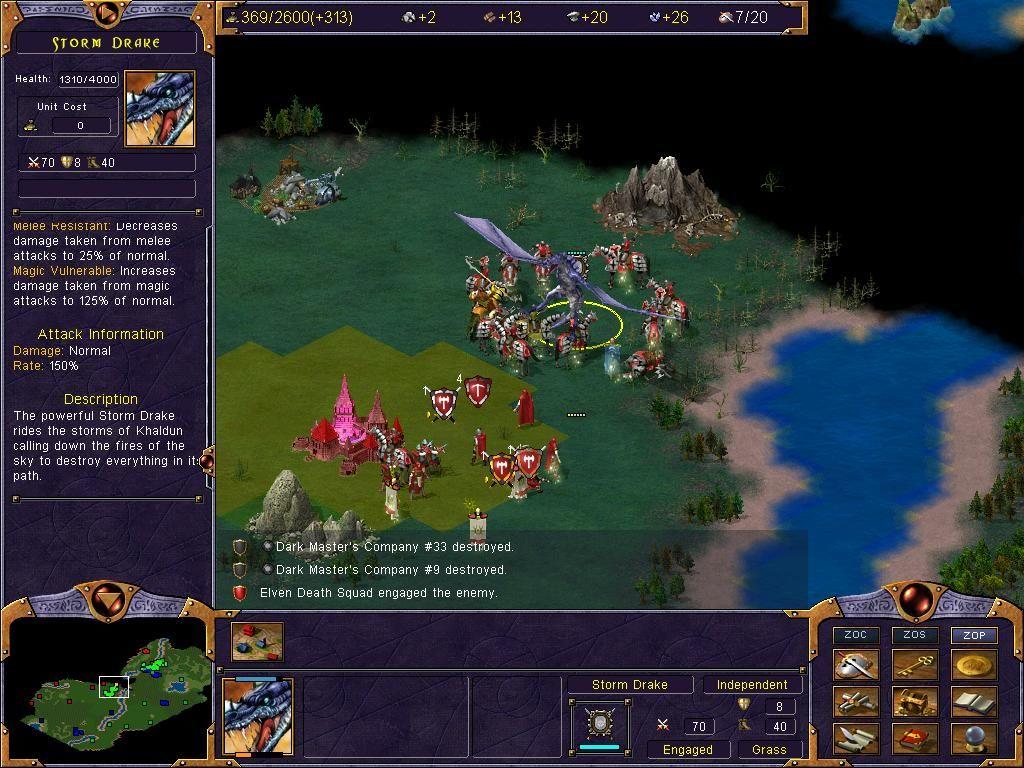
Real-time strategy games have gone through waves of popularity over the last six or seven years. I’ve always liked the concept — starting with Dune 2 on the Amiga back in the early 90s and continuing through the Command & Conquer games — but they usually left me cold about halfway through the game. That is until I played Kohan: Immortal Sovereigns. For the first time in quite awhile, a PC strategy game had me staying up late, playing ’til I was bleary-eyed and exhausted.
Kohan puts you in the role of a recently awakened immortal who has survived a Great Cataclysm with little memory of his past. It is up to you to free the land of Khaldun from a dark force known as The Shadow by reviving other immortals and using strategy to defeat its armies.
What sets Kohan: Immortal Sovereigns apart from other real-time strategy games of late is that strategy actually plays a part in the game’s proceedings. Simply creating large armies that overpower your opponents will not work. This is because the game does not allow that type of blitzkrieg tactic. The creation of your forces — known as companies — is dependent upon the economic situation of your kingdom. If you’re short on production of certain resources, you may have to scale back your forces and rebuild your economy before flexing your military muscles.
Another of the game’s assets is the lack of micromanagement that’s involved. The companies you create actually have a relatively intelligent set of guidelines that they use to determine their course of action. Of course, you have a say in what they’ll eventually do, but they can be pretty smart on their own. The trick comes down to assembling companies that will achieve the desired results.
Because companies are made up of a front line, support elements and a commander, your job is to commission them with the right combination of offensive and defensive strengths. It’s not really difficult to get a feel for what works best in each mission, so this is an enjoyable aspect of the game. That’s something you really can’t say about the micromanagement required in most other RTS games.
It’s immediately obvious that a great deal of care went into the creation of Kohan when you choose the game’s tutorial lesson. This, of course, is meant to teach you the basics of the game’s mechanics. Without even glancing at the manual, you can gain most of the knowledge you need to take on the game confidently. This makes Kohan a very easy game to pick up and play yet it still remains challenging. (Yet, I do recommend you at least glance at the manual for many helpful tidbits of information.)
Also in Kohan‘s favor is the back story involving the world of Khaldun and the fight against the forces of The Shadow. The story, which is told via narrated text between missions, takes a few neat twists and turns as you proceed through the single player mission. It gives the game a few RPG-like qualities that I really enjoyed. However, the ending left a bit to be desired. A few political elements, like proposing alliances to the various races found in Khaldun is just icing on the cake.
When playing a real time strategy game, one doesn’t expect to be blown away by the graphics nor overwhelmed by the controls. Kohan features the usual RTS graphics, albeit in 1024×768 mode which allows for a lot of nice detail, and provides a logical and pretty responsive control system. Hot keys exist for most of the commands, but I used the mouse to control 99% of the action.
All in all, Kohan: Immortal Sovereigns is one of the most satisfying and addictive games I’ve played on the PC in years. With an expansion pack planned for release, it looks like I’ll be taking a trip back to Khaldun in the very near future. I’m really looking forward to it.
10 out of 10.
Requirements: PII 300 or equivalent, 64 MB RAM, 4X CD-ROM, SVGA card with 4MB VRAM, 400 MB disk space, Mouse, Sound card, and DirectX v7.0
Reviewed on: AMD Duron 800, 128 MB RAM, 40x DVD-ROM, 32 MB TNT2 M64 video card, Logitech Optical Mouse, Diamond MX 400 Sound Card, and DirectX 8.0a.

